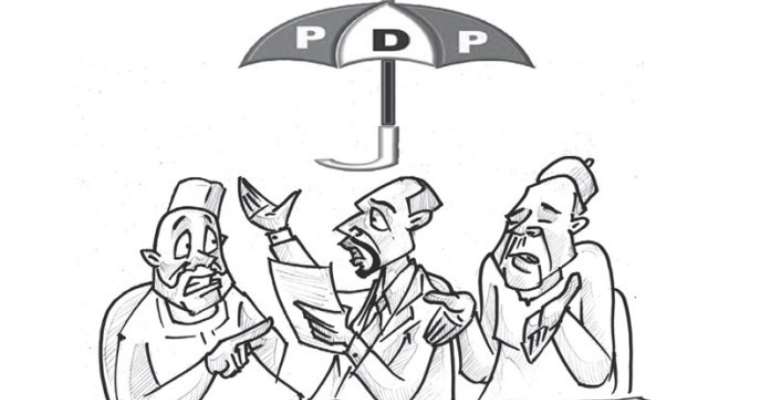Time for PDP to resolve its crisis – Thisday

Whatever happens within the PDP has considerable implications for the larger polity
With different interpretations being given to the last week's judgment of an Abuja High Court restraining the individuals 'currently parading themselves as the national officers of the PDP on the basis of the purported amendment to the PDP constitution effected at a special convention held in Abuja on December 10 and 11, 2014', it is clear that the crisis rocking the opposition will be difficult to resolve. But it is in the interest of our democracy that critical stakeholders who still command respect within the party move in so that the Peoples Democratic Party does not self-implode.
Interestingly, while the presiding judge of the Abuja High Court did not specifically mention Alhaji Ali Modu Sheriff, the order that those who became PDP national officers by virtue of the 2014 amendment to the party's constitution, which he declared unlawful and should cease to parade themselves in those capacities was explicit enough. To the extent that Sheriff became chairman by virtue of the 2014 amendment, it doesn't take any expert opinion to know that he has been thrown out. But the former Borno State governor, Sheriff, is still digging in by claiming to be the PDP national chairman, thus leaving the main opposition party in total disarray.
It is even more unfortunate that despite the fact that the PDP governors and no fewer than 24 state chairmen of the party have disowned him, Sheriff still parades himself as the party chairman, making pronouncements that can only put the PDP in a quandary, especially as regarding the forthcoming gubernatorial election in Edo State. He is also sending out subtle threats that except the crisis is resolved in his favour, the PDP might not be able to compete at the 2019 general election, lending credence to the suspicion that he could be an agent of destabilisation serving other interests.
As we pointed out in a recent editorial, to the extent that the PDP was in power at the centre in Nigeria from 1999 until last year, it is a critical stakeholder in the current democratic project. Moreover, the party also in that period controlled more than 60 per cent of the National Assembly membership as well as no fewer than 23 of the 36 states of the federation.
Given such past domination of the political landscape, we are of the firm belief that whatever happens within the PDP has considerable implications for the larger polity.
Unfortunately, for more than five months now, the PDP has been enmeshed in a self-inflicted crisis arising from the virtual overthrow of its constitution by a cult of former and serving governors. That habitual impunity explains the recent emergence of Sheriff, who had barely spent a year in the party as its acting national chairman and the attendant consequences.
The problem started when a powerful caucus in the party had, in spite of strong objections from the founders and elders of the PDP, not only imposed Sheriff, but also extended and attempted to perpetuate his tenure in a clear contravention of the zoning and rotation principles enshrined in the party's constitution. The resultant resistance of party elders led to the debacle in which three clear factions emerged.
While the party stakeholders led by the board of trustees tried to narrow the scope of the conflict by getting all members to accept the leadership of the seven-man caretaker committee led by the former Kaduna State Governor, Senator Ahmed Makarfi, a group led by Sheriff has refused to accept a resolution most reasonable people consider the best in the circumstance. And that has made it difficult for all the critical stakeholders within the party to come together so as to evolve a transparent process to elect a new PDP leadership. Sheriff and fellow travellers must be called to order.
